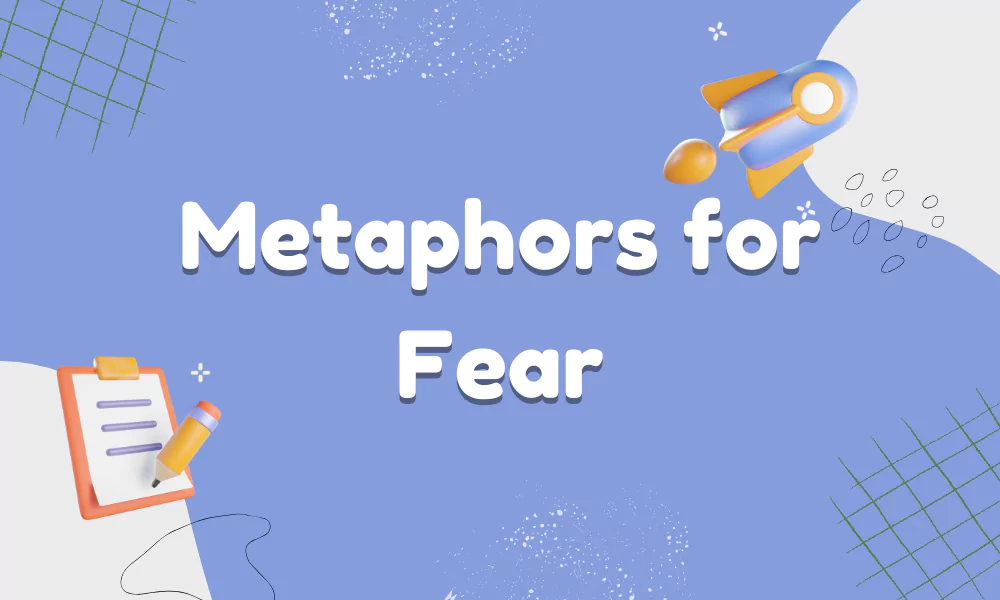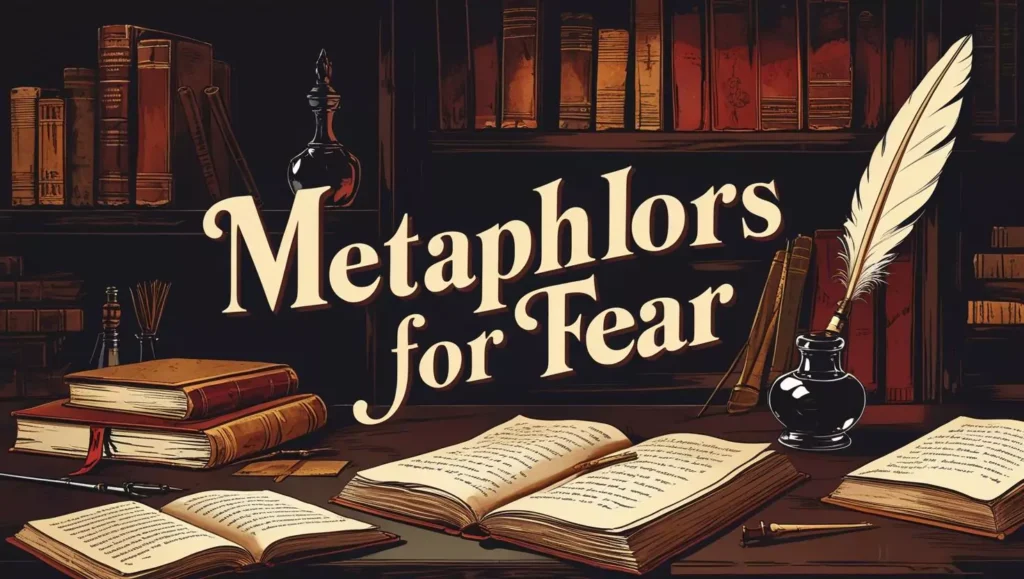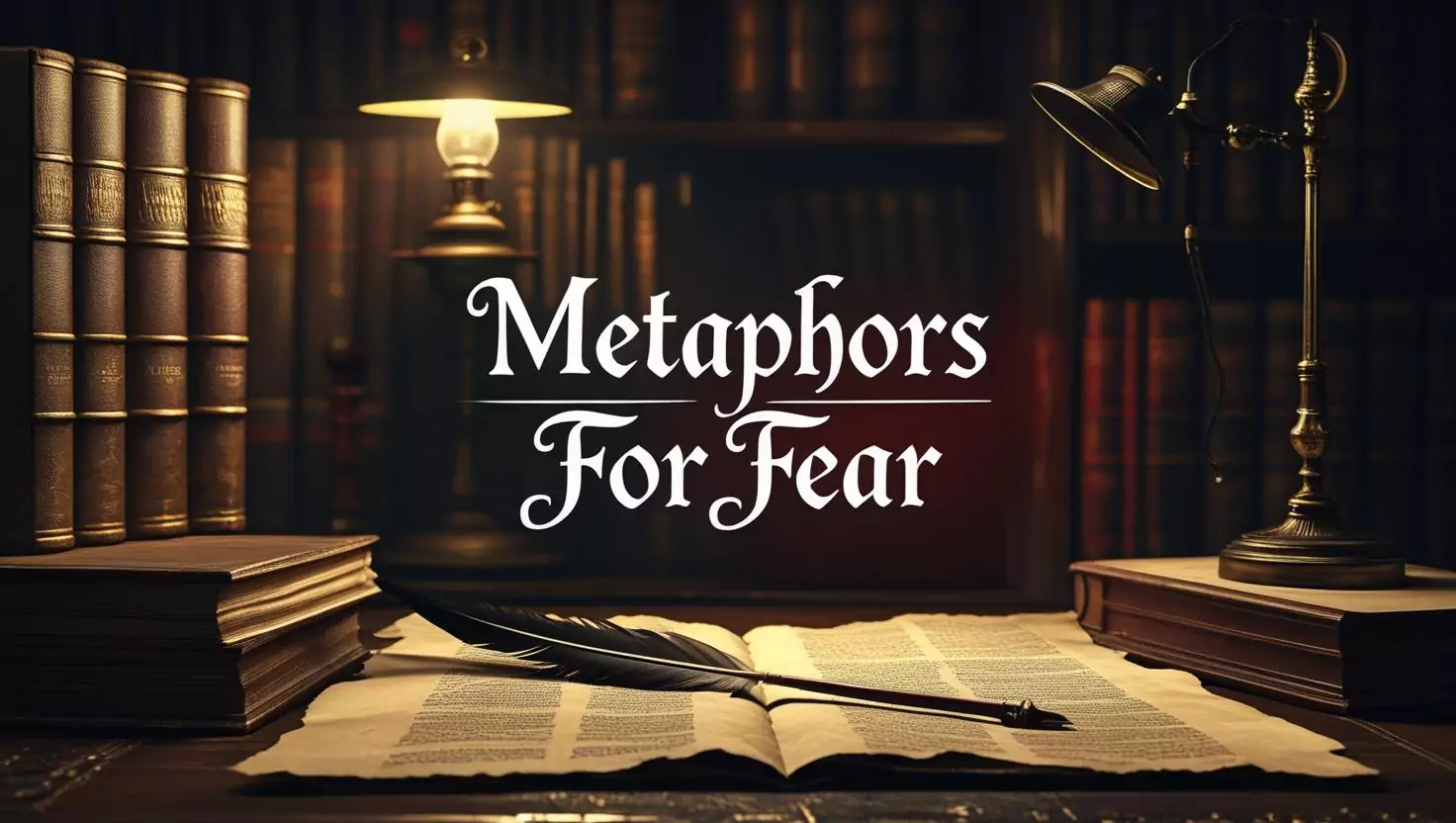Metaphors for Fear – Powerful Examples, Meanings & Usage

Fear is one of the most powerful emotions we experience, it can feel like a shadow creeping closer, a storm raging inside, or chains holding us back. For centuries, writers, poets, and storytellers have used metaphors to capture the intensity of fear, turning invisible emotions into vivid images we can see, hear, and even feel. These comparisons not only make fear easier to describe but also help us understand its impact on our thoughts, actions, and lives.
What are Metaphors for Fear?
Metaphors for fear are imaginative comparisons that describe the feeling of being afraid by linking it to vivid images, objects, or experiences. Instead of saying “I am scared,” a metaphor might describe fear as a dark shadow following you, a storm raging in your chest, or a cage that locks you in place. These expressions make the abstract emotion of fear more concrete, relatable, and memorable. Writers, speakers, and even psychologists often use metaphors to capture the intensity of fear in a way that plain language cannot, helping readers and listeners connect more deeply with the experience.

Everyday Metaphors for Fear
- Fear is a shadow
Meaning: It follows you everywhere, even when you try to ignore it.
Example: Her fear of failure was a shadow that never left her side. - Fear is a storm inside
Meaning: A chaotic rush of emotions building within.
Example: A storm of fear brewed in his chest before the big speech. - Fear is a cage
Meaning: It traps you and stops you from moving freely.
Example: She felt locked in a cage of fear, unable to chase her dreams. - Fear is quicksand
Meaning: The more you fight it, the deeper you sink.
Example: His doubts pulled him down like quicksand made of fear. - Fear is a heavy weight
Meaning: It drags you down emotionally and mentally.
Example: The weight of fear kept him from taking a single step forward. - Fear is a monster under the bed
Meaning: Something that feels bigger and scarier than it really is.
Example: Her childhood fear of rejection still felt like a monster hiding in the dark. - Fear is a locked door
Meaning: It blocks opportunities and keeps you stuck.
Example: Every time he tried to change careers, fear slammed the door shut. - Fear is fire
Meaning: It burns inside, consuming energy and peace.
Example: The fire of fear scorched his confidence. - Fear is a wall
Meaning: It stands in the way of progress.
Example: She hit the wall of fear before sharing her artwork publicly. - Fear is ice
Meaning: It freezes you in place.
Example: The icy grip of fear kept her rooted on stage. - Fear is a thief
Meaning: It steals opportunities, joy, and time.
Example: Fear is the thief that robbed him of countless chances. - Fear is a choking hand
Meaning: It feels suffocating, making it hard to breathe.
Example: A choking hand of fear gripped his throat before the interview. - Fear is a ticking clock
Meaning: It makes you feel pressured and anxious.
Example: Every passing second felt like a ticking clock of fear. - Fear is darkness
Meaning: It clouds your vision and understanding.
Example: Fear wrapped the room in darkness, hiding all hope. - Fear is a mirror
Meaning: It reflects back your insecurities.
Example: Her fear was a mirror of her deepest doubts. - Fear is an anchor
Meaning: It holds you down, preventing movement.
Example: The anchor of fear kept him from setting sail in life. - Fear is a whisper
Meaning: A constant inner voice feeding doubts.
Example: The whisper of fear told her she wasn’t good enough. - Fear is fog
Meaning: It clouds judgment and hides clarity.
Example: His mind was lost in a fog of fear. - Fear is poison
Meaning: It slowly destroys confidence.
Example: The poison of fear seeped into her decisions. - Fear is chains
Meaning: It restricts freedom.
Example: He broke the chains of fear by finally speaking up. - Fear is a mountain
Meaning: It feels impossible to overcome.
Example: Public speaking looked like a mountain of fear to her. - Fear is a maze
Meaning: It confuses and misleads you.
Example: He wandered in the maze of fear, unsure of where to go. - Fear is a siren
Meaning: It screams loudly inside you, hard to ignore.
Example: The siren of fear rang in his ears during the exam. - Fear is quick lightning
Meaning: It strikes suddenly and sharply.
Example: A bolt of fear shot through him when the door slammed. - Fear is glue
Meaning: It sticks you in place.
Example: Her feet felt glued by fear on stage. - Fear is a blindfold
Meaning: It stops you from seeing truth or opportunity.
Example: The blindfold of fear kept her from noticing her strengths. - Fear is a pit
Meaning: It feels like falling into emptiness.
Example: His stomach dropped into a pit of fear. - Fear is a cold wind
Meaning: It chills you suddenly.
Example: A cold wind of fear swept over the crowd. - Fear is a drumbeat
Meaning: It pounds inside, growing louder.
Example: The drumbeat of fear echoed in his chest. - Fear is a parasite
Meaning: It feeds on your energy.
Example: Fear was the parasite draining her happiness. - Fear is smoke
Meaning: It spreads quickly and chokes clarity.
Example: Her thoughts filled with smoke made of fear. - Fear is a wave
Meaning: It crashes suddenly and overwhelms.
Example: A wave of fear washed over him as the lights went out. - Fear is a prison
Meaning: It keeps you locked in.
Example: He lived in the prison of fear for years. - Fear is a spider’s web
Meaning: Sticky, tangled, and hard to escape.
Example: She was caught in the web of fear, struggling to break free. - Fear is an invisible chain reaction
Meaning: One fear sparks another until it spirals.
Example: His small worry set off a chain reaction of fear that grew uncontrollable.
Cultural & Literary Metaphors for Fear
- Fear is Pandora’s Box (Greek Mythology)
Meaning: Once opened, it unleashes chaos.
Example: Her secrets opened a Pandora’s box of fear in the family. - Fear is the Grim Reaper’s shadow
Meaning: A reminder of death and danger.
Example: The Grim Reaper’s shadow of fear lingered in the hospital ward. - Fear is Medusa’s gaze (Greek Mythology)
Meaning: It freezes you completely.
Example: The boss’s stare felt like Medusa’s gaze, turning him to stone with fear. - Fear is Shakespeare’s dagger
Meaning: A hallucination of dread, like Macbeth’s vision.
Example: The dagger of fear pointed him toward decisions he regretted. - Fear is Dracula’s bite
Meaning: It drains your life force.
Example: The bite of fear left him pale and shaken. - Fear is the Minotaur in the labyrinth
Meaning: A hidden monster waiting within life’s maze.
Example: He felt trapped with a Minotaur of fear chasing him. - Fear is a cursed prophecy
Meaning: Something unavoidable once heard.
Example: The cursed prophecy of fear haunted her every step. - Fear is a haunted house
Meaning: Full of hidden, creeping terrors.
Example: Walking into the meeting was like stepping into a haunted house of fear. - Fear is Frankenstein’s monster
Meaning: A creation of our own mind that turns against us.
Example: His fear became Frankenstein’s monster, larger than reality. - Fear is a poisoned apple (Fairy Tale)
Meaning: Something tempting but dangerous.
Example: The poisoned apple of fear kept her from trusting anyone. - Fear is Poe’s raven
Meaning: A constant reminder of dread.
Example: The raven of fear sat on his shoulder, whispering “nevermore.” - Fear is Achilles’ heel
Meaning: A hidden weakness.
Example: Public speaking was his Achilles’ heel of fear. - Fear is a ghost
Meaning: Something from the past that still haunts.
Example: The ghost of fear returned every time she tried again. - Fear is a Trojan horse
Meaning: It sneaks in disguised, then attacks.
Example: Fear entered like a Trojan horse, hidden behind his confidence. - Fear is Icarus’ fall
Meaning: The consequence of flying too close to danger.
Example: The fear of Icarus’ fall stopped her from taking risks.
Creative & Modern Metaphors for Fear
- Fear is a computer virus
Meaning: It spreads through your mind, corrupting thoughts.
Example: A virus of fear infected his every decision. - Fear is Wi-Fi disconnection
Meaning: It leaves you cut off and helpless.
Example: Losing her confidence felt like a Wi-Fi disconnection of fear. - Fear is a broken app
Meaning: It glitches and stops you from functioning properly.
Example: His confidence crashed like a broken app under fear. - Fear is a pop-up ad
Meaning: Sudden, distracting, and unwelcome.
Example: Pop-up ads of fear kept interrupting her peace of mind. - Fear is a video game boss
Meaning: Intimidating and hard to defeat, but possible.
Example: The job interview felt like a final boss of fear. - Fear is a frozen screen
Meaning: It paralyzes you suddenly.
Example: Her mind turned into a frozen screen of fear. - Fear is a dead battery
Meaning: It drains your energy.
Example: He felt like a dead battery after hours of silent fear. - Fear is spam mail
Meaning: It keeps flooding in, whether you want it or not.
Example: Her head was full of spam messages made of fear. - Fear is an error 404
Meaning: It makes you feel lost or broken.
Example: He froze on stage—confidence not found, only fear: error 404. - Fear is an alarm system
Meaning: It triggers loudly when danger appears.
Example: The alarm of fear went off the moment she heard footsteps behind her. - Fear is low battery mode
Meaning: It forces you to shrink and conserve.
Example: She lived in low battery mode because of constant fear. - Fear is a glitch in the system
Meaning: It interrupts normal functioning.
Example: Fear caused a glitch in his usually calm personality. - Fear is a crashing hard drive
Meaning: It wipes out your confidence and control.
Example: Her memory blanked out like a crashing hard drive under fear. - Fear is buffering
Meaning: It makes you pause and hesitate endlessly.
Example: He stood buffering in fear instead of answering the question. - Fear is a hacked account
Meaning: Someone else (the fear) takes control.
Example: Fear hacked his mind, making decisions for him.
Synonyms of Fear With Meanings
| Synonyms | Meanings |
|---|---|
| Dread | A strong feeling of worry about something bad that might happen. |
| Terror | An intense and overwhelming sense of fear. |
| Fright | A sudden, short-lived feeling of being scared. |
| Apprehension | Uneasiness or nervousness about the future. |
| Horror | Extreme fear mixed with disgust or shock. |
| Panic | A sudden, uncontrollable burst of fear. |
| Anxiety | A state of nervousness or constant worry. |
| Alarm | A sharp awareness of danger or threat. |
| Phobia | An intense, often irrational fear of a specific thing. |
| Unease | A mild, nagging feeling of discomfort or worry. |

How to Use Fear Metaphors in Writing & Speaking
- Match the Metaphor to the Intensity of Fear – Use soft metaphors (fear is a whisper) for mild unease and strong ones (fear is a raging storm) for extreme terror.
- Engage the Senses – Describe how fear feels physically: the icy grip of fear, a drumbeat in the chest. This makes writing vivid and realistic.
- Keep it Relatable – Use everyday comparisons that readers instantly understand, like fear is quicksand or fear is glue.
- Avoid Overcrowding with Metaphors – One strong metaphor per scene, speech, or paragraph is more powerful than stacking too many.
- Use Fear Metaphors for Emotional Impact – In stories or speeches, metaphors help the audience feel the fear, not just read about it. Example: Instead of “She was nervous,” write “Fear wrapped her in chains, holding her back.”
Read: Idioms for Difficult
FAQs
Conclusion
Fear is a universal human emotion, but finding the right words to describe it can be challenging. That’s where metaphors for fear come in, they transform invisible feelings into vivid, relatable images. Whether fear feels like a shadow lurking behind you, a storm raging inside, or chains holding you back, these metaphors make it easier to understand, express, and even manage our emotions. Writers, speakers, and storytellers can use these powerful comparisons to create stronger emotional impact, while readers can connect with them on a personal level. By learning how to use fear metaphors effectively, you not only improve your writing and communication but also gain new insight into one of the most powerful emotions we all share.
